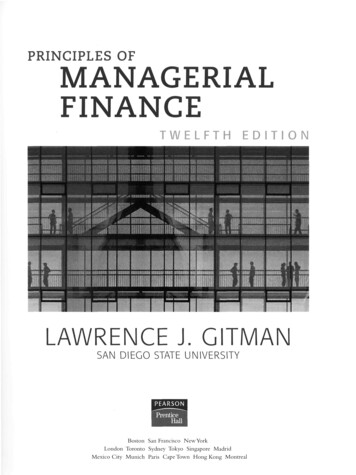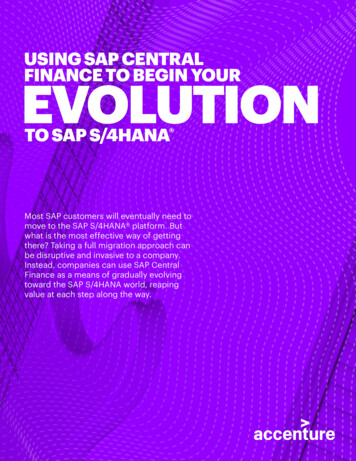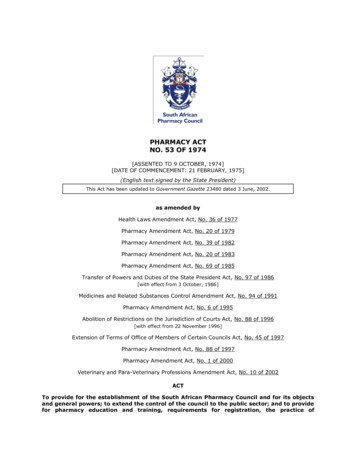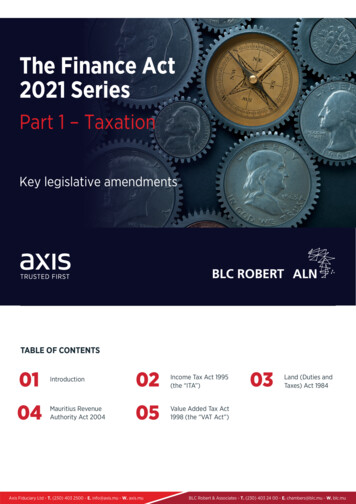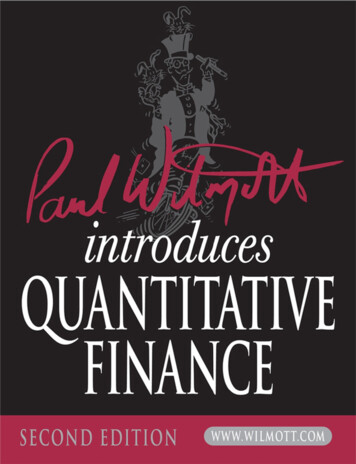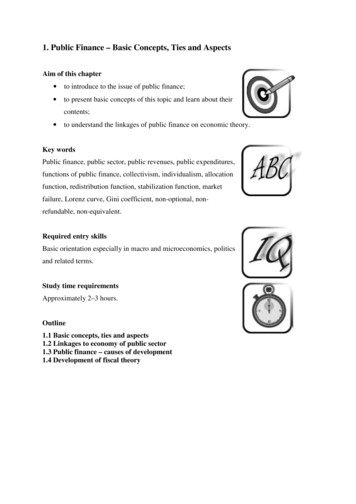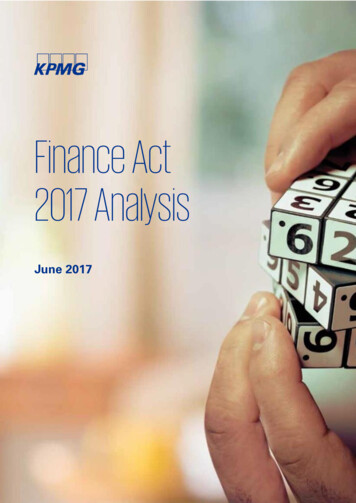
Transcription
Finance Act2017 AnalysisJune 2017 2017 KPMG Advisory Services Ltd, a limited liability company duly registered under the laws of Kenya and a member firm of the KPMG network of independent firms affiliated with KPMGInternational Cooperative (“KPMG International”), a Swiss entity. All rights reserved.
Income Tax ChangesFinance Act 2017Focus areaChange in the Law and KPMG commentsEffectivedateTaxation ofIslamic FinancialArrangementSection 2 is amended by including definitions relating to Islamic banking:3 April 2017Amendment toSection 2-‘Islamic finance’ arrangement to refer to all financial arrangements that are structured in accordance-with Islamic law‘Islamic finance return’ to mean any amount received or paid in relation to Sukuk or an Islamicfinance arrangement-The definition of interest to be expanded to include Islamic finance return, which was previously notprovided forThe amendments to the ITA will provide clarity on the taxation of Islamic banking products which are fastbecoming a major source of funding for development worldwide. Locally, the government is looking to tap intoIslamic Finance as an alternative source of funds for development projects.These provisions are replicated in the changes that the Finance Act has implemented to the VAT Act, 2013.DeductibledonationsAmendment toSection 15(2)Ascertainment ofgains or profits ofbusiness in anon-preferentialtax regimeSection 18 of theITAOrdinarily, donations are only allowable if they meet the Income Tax (Charitable Donations) Regulations, 2007.Key among the conditions in the Regulations is that the donation should be in cash and that it should be madeto a charitable organisation with a tax exemption certificate from the Kenya Revenue Authority (KRA).3 April 2017The Act now permits tax deductions for donations made to the Kenya Red Cross, County Governments or othernational disaster management bodies to alleviate the effects of calamities which have been declared nationaldisasters by the President.As a result of the promotion of Special Economic Zones (SEZs) whose scope will cover a wide spectrum ofeconomic activities, there will be significant transactions between entities within and those outside the zones.Section 18A of the Finance Act has introduced a provision requiring that transactions between related entities,where one is based in a preferential tax regime and the other not be carried out on an arm’s length basis.3 April 2017Where the gains attributed to the entity operating outside the preferential tax regime are deemed to beunderstated, the KRA will have the power to adjust the gains to reflect the gains that would be expected if theentities were transacting on an arm’s length basis.This provision, effectively introduces transfer pricing provisions for local companies where one company islocated in a preferential tax regime and the other is not.Changes affectingSpecial economiczones:The Finance Act includes a number of provisions which are designed to encourage investment in the specialeconomic zones. These are as follows: Dividends paid by SEZ Enterprises, Developers or Operators to non-resident persons are exempt fromwithholding tax (First Schedule to the ITA). Capital expenditure by a SEZ enterprise on the construction of a building or on the purchase andinstallation of machinery for use by the enterprise in carrying out its business are eligible for 100%investment deduction in the first year of use (Paragraph 24C of the Second Schedule to the ITA). Investments outside Nairobi and Mombasa counties qualify for 150% investment deduction in firstyear of use. Preferential withholding tax rates on payments to non-resident persons as follows (Third Schedule):Current non-resident rate (%)SEZ rate (%)Management, professional and training fees205RoyaltiesInterest2015551 January2018 2017 KPMG Advisory Services Ltd, a limited liability company duly registered under the laws of Kenya and a member firm of the KPMG network of independent firms affiliated with KPMGInternational Cooperative (“KPMG International”), a Swiss entity. All rights reserved.
Income Tax Changes continuedFinance Act 2017There is an amendment to specify that the reduced corporation tax rates for SEZ Enterprises (10% for the first10 years and 15% for the subsequent 10 years) apply irrespective of whether the entities sells to marketswithin or outside Kenya.InvestmentDeductionsThe Finance Act introduces investment deductions on the construction of transportation and storage facilitiesfor petroleum products by the Kenya Pipeline Company Limited. This envisages the construction of a pipelineand storage facilities for petroleum products.1 January2018NewReduction of taxrate for motorvehicleassemblers (ThirdSchedule)The Act introduces a reduced corporation tax rate of 15% for companies that are newly incorporated to carryout local assembly of motor vehicles. The reduced rate is applicable for the first five years from the date ofcommencement of operations. Provided that the rate shall be extended for an additional period of five years ifthey achieve a local content of 50% of the ex-factor value of the motor vehicles.1 January2018 2017 KPMG Advisory Services Ltd, a limited liability company duly registered under the laws of Kenya and a member firm of the KPMG network of independent firms affiliated with KPMGInternational Cooperative (“KPMG International”), a Swiss entity. All rights reserved.
Pay As You Earn (PAYE) ChangesFinance Act 2017Focus areaChange in the Law and KPMG commentsEffectivedateEnhancement ofPAYE tax bandsby a further 10%For the second year in a row, the Cabinet Secretary has expanded the Individual PAYE bands by 10%. Thisfollows an expansion of the bands by a similar margin with effect from 1 January 2017. The new bands are asfollows:1 January2018New bands (KES)Old bands (KES)RateFirst 147,580First 134,16510%Next 139,043Next 139,043Next 139,043Over 564,709Next 126,403Next 139,043Next 139,043Over 513,37415%20%25%30%The above changes will provide a welcome cushion to taxpayers whose income has been adversely affected byinflation.Enhancement ofPersonal Relief bya further 10%Enhancement oftax rates inrespect ofpayments orwithdrawals frompensionsSimilarly, the personal relief has increased by a 10% from KES 15,360 p.a. to KES 16,896 p.a. Following thechange, the lowest taxable income will increase from KES 12,260 p.m. to KES 13,486 p.m.In line with the changes to the PAYE bands, the Act enhances the tax bands for taxation of withdrawals fromNSSF, registered pension funds and provident funds (before the expiry of fifteen years from the date of joiningthe fund) where the withdrawals are in excess of the tax-free amounts specified under Section 8(4) and 8(5) ofthe Income Tax Act, in any one year.1 January20181 January2018The new tax bands for withdrawals in excess of the tax free amount, will be as follows:New bands (KES)Old bands (KES)RateFirst 147,580Next 139,043Next 139,043Next 139,043Over 564,709First 121,968Next 114,912Next 114,912Next 114,912Over 466,70410%15%20%25%30% 2017 KPMG Advisory Services Ltd, a limited liability company duly registered under the laws of Kenya and a member firm of the KPMG network of independent firms affiliated with KPMGInternational Cooperative (“KPMG International”), a Swiss entity. All rights reserved.
Changes to the VAT ActFinance Act 2017EffectivedateFocus areaChange in the Law and KPMG commentsPlace of supply ofgoods (Section11)The Act amends Section 11(b) regarding the place of supply for goods. Previously, for goods to have beendeemed to be supplied in Kenya, the supply had to meet the following three conditions:- The goods are delivered in Kenya;- The supply involves installation or assembly of goods at a place in Kenya; and- Where the goods are delivered outside Kenya, the goods were in Kenya when their transportationcommenced3 April 2017The Finance Act deletes the word “and” and replace it with ‘or’. Following the change, a supply of goods willbe deemed to be made in Kenya if it meets any of the above three conditions.Exemptions fromVATFirst Schedule of the VAT Act has been amended to exempt a number of transactions from VAT as follows:3 April 2017ParticularsTaxable equipment and apparatus for the direct and exclusive use for construction ofspecialized hospitals with at least 50 beds capacity.Previously the exemption did not specify the bed capacity.Materials, articles and equipment, including motor vehicles intended for the educational,scientific or cultural advancement of the disabled for the use of an organisation approved bythe national Government for purposes of exemption.Previously the exemption only applied to materials, articles and equipment for use by theblind only.Unused postage, revenue or similar stamps with a recognised face value, stamp-impressedpaper, bank-notes, cheque forms and documents of title such as stock, share or bondcertificates.Spare parts imported by aircraft operators or persons carrying on the business of aircraftmaintenance upon recommendation by the Kenya Civil Aviation Authority (KCAA).Previously the exemption did not include propellers and related parts and aircraft undercarriage together with related parts. These are now covered. The change also requires thatimporters obtain recommendation from the KCAA to benefit from the exemption.Inputs for the manufacture of pesticides upon recommendation by the Cabinet Secretary forAgricultureSpecially designed locally assembled motor vehicles for transportation of tourists, purchasedbefore clearance through customs by tour operators upon recommendation by thecompetent authority responsible for tourism promotion provided the vehicle meet thefollowing conditions:-New rateExemptOld rateExemptExempt16%Exempt16%Exempt16% andExemptExempt16%Exempt16%the vehicles shall at all times be registered and operated by a company that is licencedunder the Tourism Vehicle Regime;the vehicles shall be used exclusively for the transportation of tourists;the vehicles shall have provisions for camping, rescue and first aid equipment, luggagecompartments and communication fittings; andany other condition the Commissioner may imposeTax on the vehicle shall become payable upon change of use or disposal of the vehicle forother use.While the above exemption may lead to reduction in the cost of the vehicles. It is alsocontradictory since the vehicles are to be locally assembled yet the exemption applied onimported vehicles. It is likely the intention was to exempt parts for the local assembly oftourist transportation vehicles.- 2017 KPMG Advisory Services Ltd, a limited liability company duly registered under the laws of Kenya and a member firm of the KPMG network of independent firms affiliated with KPMGInternational Cooperative (“KPMG International”), a Swiss entity. All rights reserved.
Value Added Tax changes continuedFocus areaFinance Act 2017EffectivedateChange in the Law and KPMG commentsExempt servicesThe Finance Act amends Part II of the First Schedule to the VAT Act that deals with Exempt services to exemptthe following supplies from VAT:Services suppliedto internationaland regionalorganizations Asset transfers and other transactions related to the transfer of assets into Real Estate Investment Trustsand Asset backed Securities as Paragraph (n); The Finance Act has clarified that financial services which are structured to conform to Islamic Financeprinciples.The Finance Act amends the Second Schedule to the VAT Act to provide that both goods and services suppliedto international and regional donor bodies and other diplomatically accredited bodies qualify for zero-rating.3 April 20173 April 2017Previously, the organizations which enjoyed various tax privileges faced a hard time with KRA on the VATtreatment of the services received as the Second Schedule only provided for goods. This is a welcome changefor the organizations most of which incur large amounts on services in carrying out their activities.Zero-ratingThe Finance Act has amended the Second Schedule to the VAT Act to zero-rate the following products:ParticularsNew rateOld rateSupply of maize (corn) flour, cassava flour, wheat or meslin flour andordinary breadZero ratedExemptTaxable goods supplied to marine fisheries and fish processors uponrecommendation of relevant state departmentsZero rated16%Milk and milk cream productsZero ratedExemptInputs for manufacturing of pest control productsZero rated16%Pest control productsZero ratedExempt 2017 KPMG Advisory Services Ltd, a limited liability company duly registered under the laws of Kenya and a member firm of the KPMG network of independent firms affiliated with KPMGInternational Cooperative (“KPMG International”), a Swiss entity. All rights reserved.
Excise Duty ProvisionsFinance Act 2017Focus areaChange in the Law and KPMG commentsEffectivedateSection 10 of theExcise Duty ActThe Finance Act has amended the Excise Duty Act to provide for bi-annual adjustments of the specific rates ofduty. Previously the Act provided for annual adjustments.Adjustment ofduty rates forInflationNewSection 15 of theExcise Duty ActFinance Act amends Paragraph 15(1)(d) to the Excise Duty Act, 2015 (Excise Duty Act) to include illuminatingkerosene for use in products manufactured in Kenya.Activitiesrequiring alicense in KenyaFollowing the amendment, manufacturers who use illuminating kerosene to produce un-excisable goods willbe expected to apply to the Commissioner for a licence.Section 29 of theExcise Duty Act.Refund of excisedutyFirst Schedule ofthe Excise DutyActExcise DutyChanges1 January2018The Finance Act deletes Paragraph 29(b) of the Excise Duty Act and substitutes it with a provision permittingthe refund of excise duty paid in respect of spirits or illuminating kerosene used by a licensed or registeredmanufacturer to manufacture un-excisable goods upon written application to the Commissioner.3 April 20173 April 2017This is an incentive that aims to promote the competitiveness of locally manufactured paints and resins.The Finance Act implements the following changes to the First Schedule to the Excise Duty Act:ParticularsSpirits of un-denatured ethyl alcohol; spirit liqueursand other spirituous beverages of alcoholic strengthexceeding 10%Cigarettes without filtersNew rateKES 200 per LitreOld rateKES 175 perLitreKES 1,800 permilleKES 2,500 perMille3 April 2017In addition, Part III has been amended to expand the definition of powdered beer to include any powder,crystals or any other dry substance which, after being mixed with water or any other non-alcoholic beverages,ferments to, or otherwise becomes an alcoholic beverage.Second Scheduleof the Excise DutyActExcise DutyChangesAmending paragraph 5 of part A by inserting the wording ‘or St John’s Ambulance’ immediately after thewords Kenya Red Cross.3 April 2017Paragraph 5 provides that excisable goods imported or purchased by Kenya Red Cross for official use in theprovision of relief services in Kenya will be exempt from Excise Duty.This amendment is intended to recognize and facilitate the St John Ambulance plays in responding toemergencies.Paragraph 10 ofthe Excise DutyActAmending paragraph 10 of the Second Schedule to the Excise Duty Act which provides exemptions on exciseduty for excisable goods imported for direct use in the manufacture of sanitary towels to include ‘or purchasedlocally’ immediately after the word imported.3 April 2017This now provides that goods purchased locally and used in the manufacture of sanitary towels are exemptfrom Excise Duty, and is aimed at lowering the cost of the sanitary products. 2017 KPMG Advisory Services Ltd, a limited liability company duly registered under the laws of Kenya and a member firm of the KPMG network of independent firms affiliated with KPMGInternational Cooperative (“KPMG International”), a Swiss entity. All rights reserved.
Changes to the Tax Procedures ActFocus areaChange in the Law and KPMG commentsEnhancingpowers of anAuthorised OfficerThe Finance Act, 2017 enhances the powers of an Authorised Officer as contained in Section 7 of the TaxProcedures Act, 2015 (TPA) by introducing Subsection 2 which gives KRA officers power to enter and searchany premises or vessels and seize, collect and detain evidence and produce the evidence in any proceedingsbefore a Court of Law or Tax Appeals Tribunal.Finance Act 2017Effectivedate3 April 2017Previously, the TPA offered Authorised Officers all the powers, rights, privileges and protection of a PoliceOfficer in the performance of their duties but did not expressly authorize the use of the evidence gathered bythe Authorised Officers in a judicial or quasi-judicial process.Registration of aTaxRepresentativeThe Finance Act provides that a tax representative shall be registered in the name of the non-resident personbeing represented and the Commissioner shall issue a PIN to the tax representative.Further, the amendment provides that a person may be a tax representative of more than one persons.The above provisions serve to formalize the process of appointment of a tax representative by providing for theform of registration and the issuing of a PIN. Previously, the appointment of a tax representative was notclearly provided for as the Act only provided that a tax representative may be appointed without giving thespecifics of the appointment.1 January2018NewThis provision provides clarity on the use of the tax representatives allowing one person to represent morethan one non-resident person.Tax amnesty onvoluntarydeclaration ofoffshore incomeThe Act extends the amnesty deadline for voluntary declaration of taxable offshore income by 6 months from31 December 2017 to 30 June 2018.Self-Assessment Returns for the year of income 2016 and prior should be filed by 30 June 2018 to qualify forthe amnesty. The Act introduces a new condition that the voluntarily income should be repatriated to Kenya aspart of the amnesty application.3 April 2017NewFurther, the Act provides that where no funds have been transferred within the period of the amnesty, thereshall be allowed a five year period for repatriationing the funds but a penalty of 10% will apply.Withholding VAT(WHVAT)The Finance Act introduced the following changes to WHVAT: Exemption from WHVAT requirements where a supplier proves to the Commissioner that they are likely to Clarification ofthe meaning of‘tax liability’be in a credit position for more than 24 months due to the nature of their business and imposition WHVATobligation.WHVAT is to be remitted to the KRA on or before the 20th day of the month following the month of thededuction. This brings the law in line with practice where taxpayers have been remitting WHVAT by the20th of the month following the month of deduction together with the VAT returnFailure to withhold and/or remit WHVAT deducted by the 20th of the following month is now an offencewhich attracts a penalty equivalent to 10% of the amount involved.Previously there was a contention as to when WHVAT was due and the penalty for non-compliance as thesewere not clearly stated.The TPA defines tax liability to include any late payment interest payable in respect of a tax liability. Thisdefinition excludes penalties relating to the tax liability.3 April 2017New3 April 2017The Act amends this by expanding the definitions as follows: a tax liability of a taxpayer includes any penaltyor late payment interest payable in respect of the liability.’ 2017 KPMG Advisory Services Ltd, a limited liability company duly registered under the laws of Kenya and a member firm of the KPMG network of independent firms affiliated with KPMGInternational Cooperative (“KPMG International”), a Swiss entity. All rights reserved.
Changes to other legislationsFocus areaChange in the Law and KPMG commentsTaxation of theGambling IndustryThe amendment raises the taxes for betting, lottery, gaming and competition companies from the currentrates of 7.5%, 5%, 12% and 15% to a uniform tax rate of 35%. This tax is in addition to the normalcorporation tax of 30%.Sections 29A(1),44A(1), 55A(1) and59B(1) of theBetting, Lotteriesand Gaming ActMarine InsuranceFinance Act 2017Sections 2, 5, 27,68A, 96B andParagraph 4 of theSchedule to theStamp Duty Act;Section 2, 205 (3A)& (3B) of the PublicFinanceManagement Act;Section 4 of the Cooperative SocietiesAct and 2, 23 & 68of the SACCOSocieties ActIncreased Powersof the RBA andadditionalcompliancerequirementsSection 5, 26 and34 of theRetirement BenefitActAppeals under theTax TribunalProviso to Section13(7) of the TaxAppeals TribunalAct, 20131 January2018The move is an attempt by the Cabinet Secretary to the Treasury to cash in on the phenomenal growth thatthe industry has experienced in the recent past. The tax is to be put into a special fund to finance sportsactivities in the country.The Marine Insurance Act has been amended to bring it in line with the provisions of Section 20 of theInsurance Act which requires all insurance covers to be place under insurance companies registered inKenya. The Amendment requires all persons with insurable interest in marine cargo to place marineinsurance with an insurer registered in Kenya unless an exemption is sought.This serves to boost the measures in place to promote local insurance business by ensuring Kenyans takemarine insurance covers with local companies.Recognition ofIslamic financialproductsEffectivedate1 January2017NewThe amendment relates to the inclusion of various definitions and Sharia compliant products in thesubstantive laws to facilitate the operationalization of Islamic financial products in Kenya, these includeamendments to:a)b)c)The Stamp Duty, Act – amendment intended to create tax neutrality for Islamic financial productsto enable them favourably compete with other conventional financial products in the Kenyanmarket;The Public Finance Management Act - amendment intended to create tax neutrality for Islamicfinancial bonds to enable them favourably compete with other conventional bonds in the Kenyanmarket;The Co-operative Societies Act - amendment seeks to address the lack of recognition of Islamicfinancing in the cooperative sub-sector of the Kenyan market; and1 January20181 July 20171 January2018d) The SACCO Societies Act - amendment intended to define “deposits” and “deposit taking SACCObusiness” to include the principles of Islamic law for recognition of Islamic SACCOs in Kenya.The objects and functions of the Retirement Benefit Authority now include the approval of theremuneration of the trustees as approved by the members during the annual general meeting to be heldevery three years.1 January20181 January2018In addition, the Retirement Benefit Act now requires a person who fails to submit any statutory return bythe due date to the Authority to pay a penalty of KES 100,000 and a further fine of KES 1,000 for each dayor part thereof during which the offence continues and where the return remain un-submitted.This additional functions and penalties are intended to ensure that the RBA has a clear indication as tohow the operations of a retirement scheme are being carried out.The Tax Appeals Tribunal Act provides that the Tribunal can hear and determine an appeal within ninetydays from the date the appeal is filed with the Tribunal, provided that during the period of one year fromthe date of its first sitting, the Tribunal may extend the period for the hearing an appeal for a period of upto sixty days if there are sufficient grounds to do so.1 January2018Since the Tribunal has been in existence for over a year, this proviso is no longer relevant hence itsdeletion. 2017 KPMG Advisory Services Ltd, a limited liability company duly registered under the laws of Kenya and a member firm of the KPMG network of independent firms affiliated with KPMGInternational Cooperative (“KPMG International”), a Swiss entity. All rights reserved.
Changes to other legislations continuedStrengthening ofthe PublicProcurement andAsset Disposal Act,2015Sections 10, 29 and114 of the PublicProcurement andAsset Disposal Act,2015Power to extendterm of receivershipThe Public Procurement and Asset Disposal Act, 2015 is amended to address the three main issues that arecritical to the successful implementation of the Act:1)2)3)1 July 2017The composition of the Public Procurement Regulatory Review Board;The composition of the Public Procurement Review Board; andThe introduction of specially permitted procurement method as an alternative procurementmethod.While the reconstitution of the two Boards is aimed at addressing the Constitutional challenges withregards to gender balance and public participation, the specially permitted procurement may be seen as away of enabling public entities to procure outside the Act and this will definitely have its own challenges.The procedures for the special procurement will be prescribed by the Cabinet Secretary to the NationalTreasury.The Act amends the Kenya Deposit Insurance Act to give the Cabinet Secretary power to extend thereceivership term for a period not exceeding 12 months.This is based on the experiences of the recent receiverships of Kenyan banks with the KDIC acting asreceiver manger.Amendment to theMiscellaneous Feesand Levies Act,2016Finance Act 2017There is an amendment is aimed at exempting Special Economic Zone Enterprises from export duty andImport Declaration Fees.There is also an amendment to exempt from Import Declaration Fees and Railway Development Levy thegoods imported for the construction of LPG storage facilities as approved by the CS1 January2018New1 January2018New 2017 KPMG Advisory Services Ltd, a limited liability company duly registered under the laws of Kenya and a member firm of the KPMG network of independent firms affiliated with KPMGInternational Cooperative (“KPMG International”), a Swiss entity. All rights reserved.
Customs Duty Provision- EAC GazetteFocus areaChange in the Law and KPMG commentsLegal NoticeEAC/69/2017:Measures onCustom DutyRatesMeasures introduced on custom duty rates include: NewFinance Act 2017EffectivedateKenya to apply a lower rate for worn clothing and other worn articles (mitumba) of HS Code 6309.00.10compared to the EAC CET. The applicable rate by Kenya is the higher of 35% or USD 0.20/Kg instead ofthe higher rate of 35% or USD 0.40/Kg under the CET for one year. The lower rate is a response tothreats by the United States to bar Kenya from accessing the US market under the AGOA framework ifthe duty on second hand clothes is increased.Kenya to apply a higher rate of 25% instead of 10% on the importation of paper and paperboardproducts. This should be seen in light of recent moves to revive the local paper industry.Kenya to stay application of the CET rate of 0% on cylinders and apply a rate of 25% for one year.Kenya to stay application of CET rate of 35% or USD 200/MT instead of 75% or USD 375/MT on ricewhichever is higher for a period of one year.1 July 2017Legal Notice EAC/70/20171 July 2017Kenya to give a remission of duty as follows:ParticularsWheat (wheat grain)Raw sugar for manufacture of industrial sugarNew rate10%0%Old rate35%PeriodOne yearOne yearSpecific importers have been Gazetted and allocated quotas to import the wheat under remission to meet thedeficit in KenyaEast AfricaCommunityCustomsManagement(Duty Remission)RegulationsThe raw sugar shall be used for the manufacture of industrial sugar which is mainly used in manufacturing ofconfectionery and beverages although none of the EAC countries produces industrial sugar.The remission is in line with Government’s plans to start the manufacturing of industrial sugar in Kenya.Currently the refined sugar used in Kenya is imported from Brazil, India and Thailand.Legal Notice EAC/71/20171 July 2017The Legal Notice suspends the conditions imposed in 2013 specifying the motorcycle parts that can beimported under remission as well as those that must be manufactured in Kenya.This will serve to spur growth in manufacturing and especially the motor cycle assembly industry. Specificimporters have been Gazetted together with the quantities each can import under remission. The remission willlast for one year after which the specific conditions set out under Legal Notice EAC/39/2013 will revertLegal Notice EAC/72/20171 July 2017The progressive phasing out of remissions on importation of sugar for industrial use introduced in 2016 hasbeen suspended for one year and the duty rate has been set at 10%. This is because specific sectors such asmanufacturing of confectionery as well as beverages rely on industrial sugar which is imported.Legal Notice EAC/83/2017East AfricaCommunityCustomsManagement ActProtocol on theEstablishment ofthe EAC CustomsUnion1 July 2017It amends the general exemptions under customs duty to include equipment and inputs for the exclusive use inthe distribution of oil, gas or geothermal to the existing exemption on equipment for use in exploration anddevelopment. This is in line with plans by EAC states to build oil pipelines in preparation for the exportation ofoil from Kenya and Uganda.Legal Notice EAC/84/2017The amendment allows a one year duty exemption on the sale of up to 20% of the annual production ofgarments and leather footwear manufactured in the Export Processing Zones (EPZ) within Kenya. OrdinarilyEPZ products sold to the local market are treated as imports and subjected to duty. The CET will continue toapply to the products when sold in the other EAC countries.1 July 2017The exemption is in line with the GOK’s plan to promote growth of the textiles industry by allowing the localsales of EPZ manufactured clothing. It also enables Kenyans to enjoy high quality products manufactured inKenya. 2017 KPMG Advisory Services Ltd, a limited liability company duly registered under the laws of Kenya and a member firm of the KPMG network of independent firms affiliated with KPMGInternational Cooperative (“KPMG International”), a Swis
and Asset backed Securities as Paragraph (n); The Finance Act has clarified that financial services which are structured to conform to Islamic Finance principles. 3 April 2017 Services supplied to international and regional organizations The Finance Act amends the Second Schedule to the VAT Act to provide that both goods and services supplied
